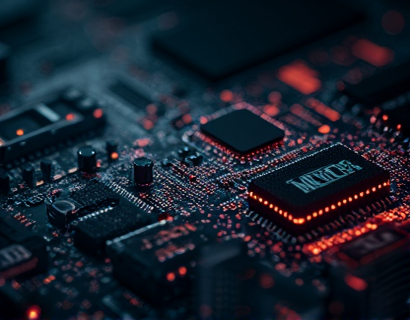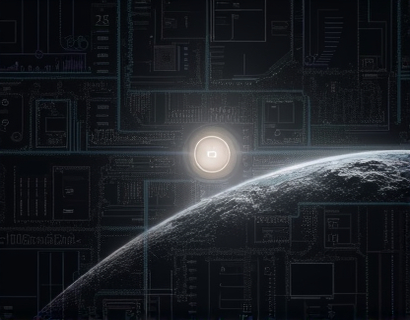Decentralized Innovation: Transforming Global Blockchain Ecosystems Through Comprehensive Collaboration Platforms
The advent of blockchain technology has ushered in a new era of decentralization, offering unprecedented opportunities for innovation and collaboration across various industries. At the heart of this transformation lies the need for comprehensive platforms that can enhance the efficiency, scalability, and governance of decentralized networks. This article delves into the concept of decentralized innovation, focusing on how advanced collaboration platforms are revolutionizing global blockchain ecosystems. By fostering a robust environment for connection, resource sharing, and collective decision-making, these platforms are driving the next wave of growth and adoption in the blockchain space.
Understanding Decentralized Innovation
Decentralized innovation refers to the process of developing and implementing new technologies, processes, or business models that operate without central authority or control. In the context of blockchain, this means leveraging decentralized networks to create systems that are more resilient, transparent, and inclusive. The core principle behind decentralized innovation is to distribute power and decision-making across a network of participants, rather than concentrating it in the hands of a few.
This approach not only enhances security and reduces the risk of single points of failure but also encourages a diverse range of perspectives and ideas. The result is a more dynamic and adaptive ecosystem that can quickly respond to changing market conditions and user needs. However, realizing the full potential of decentralized innovation requires more than just technological advancements; it demands comprehensive platforms that facilitate collaboration and governance among a global community of enthusiasts and innovators.
The Role of Collaboration Platforms in Decentralized Networks
Collaboration platforms play a pivotal role in transforming decentralized networks by providing the necessary tools and infrastructure for users to connect, share, and collaborate effectively. These platforms serve as the backbone of decentralized ecosystems, enabling participants to work together seamlessly despite geographical and organizational boundaries.
One of the key features of these platforms is their ability to facilitate communication and knowledge sharing. Through integrated messaging, forums, and documentation tools, users can easily exchange ideas, ask questions, and provide support to one another. This continuous flow of information helps to build a collective knowledge base that accelerates learning and innovation within the community.
Moreover, collaboration platforms empower users to contribute to the development of decentralized applications (dApps) and protocols. By providing access to development environments, testing frameworks, and deployment tools, these platforms lower the barriers to entry for new participants. This democratization of development resources ensures that talent from diverse backgrounds can contribute to the growth and improvement of blockchain projects.
Enhancing Governance Through Decentralized Platforms
Effective governance is crucial for the sustainability and success of decentralized networks. Traditional centralized governance models often struggle to adapt to the fast-paced and dynamic nature of blockchain technology. Comprehensive collaboration platforms address this challenge by introducing decentralized governance mechanisms that allow community members to participate in decision-making processes.
These platforms typically incorporate voting systems, proposal management tools, and transparency features that ensure all decisions are made in the best interest of the community. By giving users a direct say in the direction and development of the network, decentralized governance fosters a sense of ownership and accountability among participants. This, in turn, enhances trust and engagement, leading to a more cohesive and resilient ecosystem.
For instance, liquid democracy, a form of delegated governance, allows users to delegate their voting power to trusted representatives. This hybrid approach combines the benefits of direct democracy with the efficiency of representative governance, making it an attractive solution for decentralized networks. Collaboration platforms can integrate such mechanisms, providing a user-friendly interface for participants to engage in governance activities.
Driving Global Efficiency and Scalability
The global nature of blockchain ecosystems necessitates solutions that can scale efficiently across different regions and time zones. Comprehensive collaboration platforms are designed to support this scalability by offering features that cater to a diverse and distributed user base.
One such feature is multilingual support, which ensures that users from various linguistic backgrounds can fully participate in the ecosystem. Additionally, time zone-aware scheduling tools help coordinate meetings and events, making it easier for global teams to collaborate effectively. These tools not only enhance productivity but also promote inclusivity, allowing participants from all corners of the world to contribute to the network's growth.
Scalability also extends to the technical capabilities of these platforms. They must be able to handle a large number of users and transactions without compromising performance. This requires robust infrastructure, optimized algorithms, and continuous monitoring to ensure seamless operation. By addressing these technical challenges, collaboration platforms enable decentralized networks to grow and evolve without bottlenecks.
Case Studies and Real-World Applications
To better understand the impact of comprehensive collaboration platforms on decentralized networks, let's explore a few real-world examples. One notable instance is the use of decentralized autonomous organizations (DAOs) within blockchain ecosystems. A DAO is a community-driven entity governed by smart contracts on a blockchain, where decisions are made through token-based voting.
Platforms that support DAO creation and management have enabled projects to implement transparent and fair governance models. For example, a decentralized finance (DeFi) project can use a collaboration platform to manage its treasury, set interest rates, and allocate funds based on community votes. This not only enhances trust among users but also ensures that the project remains aligned with the collective interests of its stakeholders.
Another application is in the realm of open-source software development. Blockchain-based collaboration platforms can facilitate the development of decentralized applications by providing a centralized repository for code contributions, issue tracking, and community discussions. This approach accelerates the development process and ensures that the software remains secure and up-to-date through collective effort.
Challenges and Future Directions
While comprehensive collaboration platforms offer significant benefits, they also face several challenges that need to be addressed to fully realize their potential. One major challenge is ensuring the security and privacy of user data. As these platforms handle sensitive information and critical decision-making processes, robust security measures are essential to prevent breaches and maintain user trust.
Another challenge is achieving widespread adoption. For collaboration platforms to drive meaningful change, they need to be user-friendly and accessible to a broad audience. This requires continuous improvement in user interface design, educational resources, and community engagement strategies.
Looking ahead, the future of decentralized innovation lies in the integration of advanced technologies such as artificial intelligence (AI) and machine learning (ML). These technologies can enhance the capabilities of collaboration platforms by providing insights, automating tasks, and improving user experiences. For instance, AI-driven recommendation systems can suggest relevant projects, proposals, and community members based on user preferences and contributions.
Furthermore, the development of interoperable platforms that can seamlessly connect different blockchain networks will be crucial for fostering a truly global and interconnected ecosystem. By breaking down silos and enabling cross-chain collaboration, these platforms can unlock new possibilities for innovation and growth.
Conclusion
Comprehensive collaboration platforms are at the forefront of transforming global blockchain ecosystems through decentralized innovation. By enhancing collaboration, governance, and scalability, these platforms empower a diverse community of enthusiasts and innovators to work together towards a common goal. As the blockchain landscape continues to evolve, the role of these platforms will become increasingly vital in driving adoption, fostering trust, and unlocking the full potential of decentralized technologies.
In conclusion, the future of blockchain is not just about technological advancements but also about building inclusive and collaborative ecosystems. Comprehensive collaboration platforms are the key to achieving this vision, paving the way for a more decentralized, efficient, and resilient global network.











































